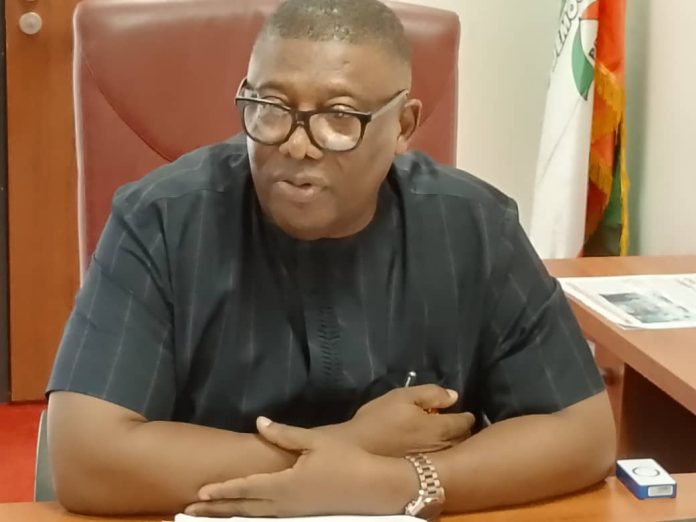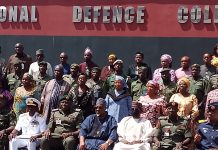Senator Augustine Akobundu is a senator representing Abia Central in the 10th Senate. In this interview with newsmen, he extolled the efforts of lawmakers in the passage of the South East Development Commission bill. He said the bill will provide regional cohesion.
To tackle the issue of insecurity, Senator Akobundu canvassed for rural community watchers. Indeed, he revealed the causes of insecurity in the southeast.
EXCERPT:
Q: The Senate passed a bill on the South East development Commission recently which is awaiting presidential assent. What does this portend for the corporate existence of this country?
ANS: Well, first and foremost, I think I just came, I want to appreciate the sponsors of the bill. From the records it started from the House of Reps and got concurrence from the Senate. The issue of south east development bill had been on for quite a while. But thankfully, it went through this time, so we thank each and every one of us who have been part of this and for me, I consider it a great opportunity to be part of history. as per what that it portends for Southeast, clearly, holistic development. South east as a region will be major beneficiaries of this platform. All that needs to be done is for our leaders at all levels to put heads together, to ensure that the advantages inherent in this bill in terms of development will be fully harnessed. And if you ask me, with political will, it will also provide regional cohesion because this is a platform that will be operated at a nonpartisan level. It is about development. Our governors, our legislators, our stakeholders, our business men, our industrialists should be involved in ensuring that all the advantages are fully harnessed. So it is a welcome development, purely for development of South East.
Q: Let us be specific, if you look at Abia state, out of the states in that geopolitical zone, it has had it own share of insecurity. Now going forward, what do you think the stakeholders should do? To tackle this ugly threat?
Insecurity is a general trend, every state has its own share of insecurity. So, like you rightly pointed out, my take is that we’ll first of all, look at the root causes of insecurity. Those causes are very significant. You are dealing with a lack of job opportunities for young ones who left school and who are leaving in schools, most of them are not employed. In some rural areas, famine is an issue. Then you look at poverty, you look at hunger, access to a better life. So the young people who are out of school who are not doing anything, are driven forcefully, may be, into all kinds of criminal activities. For me, this is the bedrock of insecurity and for the government to tackle that you have to start addressing, isolate the causes and begin to address them. But don’t forget, there are other contiguous states, contiguous states to Abia state. There are cross border criminalities, crimes committed by criminals moving from other contiguous states through local governments contiguous to local governments in Abia. People commit crimes move out. There are also crimes committed by criminals that are domiciled in the state. So all those things put together criminality is criminality. So you have to look at criminality within the context of your own state and also look at criminalities in terms of solutions from neighboring states. And what that takes us to is to have a collaborative approach in dealing with that. So no one state can say it is dealing with its own security without collaboration from governments within the entire region.
Q: Still talking about Abia state. The cases of insecurity; it has affected production of food. What are you doing personally to help cushion the effects of this food crisis.
ANS: Well, my plans are in the works, you know I came here just about three months ago. Thankfully, I was part of the preparation of the budget. I have projects, I have plans, I have programs for my constituency. Thankfully, a good number of them also meet the budget. So we are articulating our program in every sphere of human endeavor within the context of what is allowable and achievable in terms of access to opportunities. Yes, we are putting our programs together. If you look at agriculture, we have a program for agriculture, where we will encourage our farmers to farm by giving them access to fertilizer and other agro allied opportunities that can help them produce food, increase the production, and quality production from the farms.
For the areas that you have insecurity, that can be a problem because you don’t have people going into the farm and that is why the government is dealing squarely with security issues.
And for me, I’m a proponent of rural community watchers that will help improve security in the rural areas. And what that means is that you look at a local government, you must, as a deliberate policy, ensure that even the traditional institutions are trained, equipped, encouraged in the areas of intelligence gathering, and local vigilantes must be activated under the leadership of the traditional rulers because every area has it’s own leadership. And if that is done and tied together, within the local government, you’re going to have a network of local community watchers in terms of security.
This takes us back to the topical issue of community policing. Everybody in the community knows who is who, who comes in. When a stranger comes in, they know. We have to begin to go back to the traditional ways of security driven right from the rural areas where people know themselves. If a stranger comes into a particular community, everybody knows that. My local government vigilante groups have been put together under the guidance of the police. They are registered, they are operating within the framework of the law. So with that, at least, you can be sure basically, that if there are movements they are not known or acceptable to such communities, such movements will be reported. And so far, it has not been bad. There has been a reduction of security threats in certain communities. But there are some communities that are still struggling, where you have incessant kidnappings and all that. And so far, I think there is a step up in the activities of the police and the other security agencies.
I am a retired soldier. So I know that the non Kinetic aspect of fighting insecurity is more effective than the kinetic approach. But you need a combination of the two and in terms of ratio, the kinetic should be just about 30% whereas the non Kinetic should be 70%. That is, what it should be.
As the military moves in and does what they need to do, if the police is incapable of doing that definitely as they move out, Something has to be done in terms of taking care of the immediate needs of such a community. And after that, the government has to do the needful. The problem we have is that most of these communities have been abandoned by the government for a very, very long time. The borders have not been taken care of. So the aim of even having the border community agencies has been defeated a long time ago. So that’s why you have, within states, within local governments, you have all these cross border criminalities going on, so if government does its own bit by providing amenities for rural communities, that will stem the tide of insecurity and in doing so, you also empower the security agencies, to pay more attention to intelligence gathering to make sure that insecurity in such areas are checkmated. These criminals we are talking about, people know where they are.
And that’s why when it keeps happening, people keep asking, why is it that this area has been under siege for some time now, nothing is done. These Flashpoint areas are known, they strike, they move into a particular area. And so I think due attention should be paid to community policing in whichever way and that goes with a greater combination of intelligence, not just ordinary intelligence, well, processed intelligence, collected and actionable. So that when such intelligence is shared within the security agencies, they will spring into action in a well coordinated manner, to deal with that and not just dealing with that, they will also take certain deterrent actions to make sure there is no repeatition. For emphasis, the communities should be properly put in proper perspective in terms of security management.
Q: You recall that about 48 hours after one of your colleagues was suspended. Suddenly we had the revival of Southern senators forum. So let’s have a look at the timing. Don’t you think this will further polarize the country?
ANS: Southern Senators Forum has been there. What happened yesterday was the change of leadership. Southern Senators forum had been existing and the ExCO had been operating. All that happened was that yesterday, there was a change in leadership.
Q: It has been said that state policing may not see the light of the day because there are many fears that the state governors may use them as tools for political reasons. What is your take?
ANS: We have gone past that, because those who are the front of criminalities are those who are operating in the state and rural areas. If the states are not stable, the federal government will not be stable. Why are they forming vigilante groups and inaugurating them? They are uniformed and armed. Was Amotekun used for electoral purposes last time? We are talking of something that is bigger than election. Your life and my life, the lives of our children, our relations, the lives of Nigerians residing in communities. That’s why I emphasized on community policing, it doesn’t have to be Nigerian police in whichever Variante it will come. Provided it is legitimately put in place. It’s needed at this time, because most of these crimes are committed in communities. I think the crisis situation far outweighs the initial or original fears of our politicians, especially our governors hijacking the security apparatus that will be put in place when community policing comes also in place, so we’ve gone past that, we need security.
Q: After senator Ningi’s suspension, the Southern Senators met and today we’re having Northern senators meeting.
ANS: They have been existing. Southern senators forum had been existing as well as the Northern counterpart. If there are impending needs to re energize them, for purposes of unity, for purposes of governance and quality legislation, it shouldn’t be an issue. This is the budget we are talking about. If a region is not properly taken care of, the forum in a very positive manner can raise the issue up, in a non confrontational manner. We have looked at this document, nothing is suggesting that something is not balanced.













